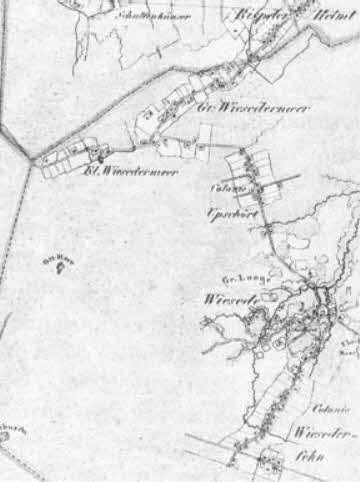|
Wiesede is one of the oldest settlements of Oestringen, which is an area stretching from the Jade Bay to the westward to the moorland. It is not known how old the locality is, but it is certainly more than 1,000 years old. Its first documented records are from the 14th century.
 Wysda, Wyszede, or Wysede lay in a fertile geest ridge and was surrounded on the north, the west, and the south by the moor. In 787 Charlemagne sent Willehad, the missionary, to Oestringen. His successor, Adalgus, founded the monastery of Reepsholt in 988 and apparently the chapels at Abickhafe and Wiesede also. Wysda, Wyszede, or Wysede lay in a fertile geest ridge and was surrounded on the north, the west, and the south by the moor. In 787 Charlemagne sent Willehad, the missionary, to Oestringen. His successor, Adalgus, founded the monastery of Reepsholt in 988 and apparently the chapels at Abickhafe and Wiesede also.
The chapel of Wiesede stood in the center of the village surrounded by a cemetery. To the north, at Preefeld, there were two chieftain residences, the Junkerei (the property of Konrad Kleyhauer) and Bunjeshausen (Bunjes Land), surrounded by old farm places named Nordwysda. To the west, a vast oak forest, Wyser-Holt, stretched up to the moor. This can be discerned from the root names of present-day places such as Hochholten, Hilgenholt, Voßholt. Various farmsteads were also to be found at Surgaste.
A brickyard (brick factory) was active in Wiesede around 1540. Because it was no longer profitable, it was sold by the Prussians (the heirs of the extinct princely family) in 1760. Finally it was owned by a family named Peters.
There were 33 farmsteads in Wiesede around 1700: nine half estates, ten old cottagers, seven Warfstellen (mound properties) and seven cottages. The occoupants names are known, and, in some cases the descendents still live at those places.
(According to Herzog: A short excerpt from the early history, provided to me by Mrs. Ch. Herzog, whom I thank herewith)
Nowadays, Wiesede is a picturesque village with lively cultural and social milieu. The village square lies right next to the above mentioned chapel. Surrounding this are some farmsteads and Warf residences, like the presentday Ökohof. This former farmstead is used by a group of unemployed. They sell the wares they have made with ecological principals in mind at the various area markets.
Also right next to the village square is the old smithy for the village. Nowadays it is used as a community hall.
|